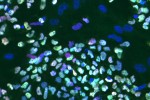A UCLA researcher has identified a key phase of human embryonic cell growth that could explain the causes of infertility and spontaneous miscarriage.
In a study published in the journal Nature Cell Biology on April 25, a team of researchers led by Amander Clark, a professor of molecular, cell and developmental biology, analyzed pluripotent cells, which are cells that can turn into any type of cell in the human body. They found that when pluripotent cells do not enter an immature development stage for the cell known as the naive state, the embryo will result in a miscarriage.
An embryo is in a naive state after fertilization and before implanting in the uterine lining, which researchers consider a crucial stage for embryo growth. In the primed state, which follows the naive state, pluripotent cells can differentiate into different types of body cells.
During the study, the researchers looked at whether nongenetic influences on human stem cells influenced embryos’ viability by comparing changes in embryonic stem cells in the naive and primed states. They found the cells that did not have the TFAP2C protein do not maintain the naive state and led to early miscarriages.
According to the study, these findings can help doctors better treat infertility and prevent future miscarriages.
